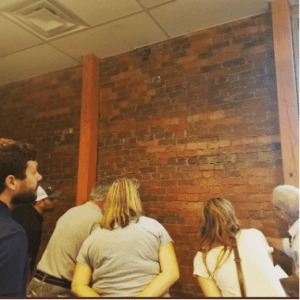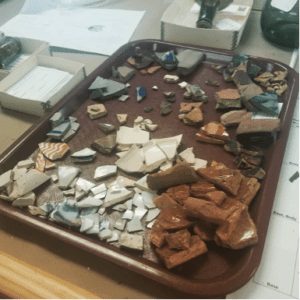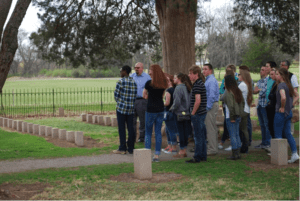Rachael Finch
Senior Director of Preservation and Education
Heritage Foundation of Williamson County, TN
Students often dislike history. The textbook is too thick, too heavy, or everything contained inside of the textbook is far removed from their own experiences. History seems like a long library catalogue of names, dates, and places too remote to have any real interest or impact on their own lives. Each year, educators are resolute to discover new methodologies to engage students with the past, especially when the past is in the rearview mirror and technology is their students’ present. What if historic preservation of place and stories became the gateway into a whole new technique of teaching the past as a part of the present? That the past is not finished once and for all, or closed up in books, but alive and living among us? Once we realize we are a part of history it is easier to connect and commit to learning more about it.
There is something very special about standing in a place where an event happened, a historically significant person lived, or understanding the daily trials and triumphs of everyday life of ordinary people. It just makes history come alive. In Williamson County, we are fortunate to have so many places; history truly happened all over our county. And yet, most of the time, we do not even realize we are standing, or living, in a historically significant and special place. For our local social studies educators who rise to meet the challenges of teaching fast paced materials in the classroom, leaving local history unexplored. This is where we educate educators on what it takes to preserve history.

Williamson County Social Studies Educators examining c1823 building techniques at a professional development workshop at the Historic Franklin Masonic Hall, June 2018. Image courtesy of Rachael Finch.
History sparks curiosity and creativity, fostering an empowered citizenry to engage in preserving their own communities. Over the past several months, our Education team committed to
modernizing our Heritage Classroom, including curated interpretive traveling exhibits, online resources, virtual field trips, and consistent communications with our educators. This also included crafting a teacher survey, specifically intended to provide direct responses from our educators and what they need from us. We are ready to deliver! Drawing upon our historic and cultural resources, our collections, and the built environment, our educational initiatives will bring dynamic programming and curriculum resources for our educators and students that will deepen critical thinking and enhance classroom learning. Teachers are always searching for innovative ways to connect the relevance of history with their students. Our goal is to encourage educators to view teaching history, particularly local history, through the lens of historic preservation.
An example of artifacts found during an archaeological dig used during hands-on workshops as part of educational

An example of artifacts found during an archaeological dig used during hands-on workshops as part of educational programming for educators. This picture was taken during a behind-the-scenes preservation and education tour at Mount Vernon, the home of George Washington, in 2018. Image courtesy of Rachael Finch.
programming for educators. This picture was taken during a behind the scenes preservation and education tour at Mount Vernon, the home of George Washington, in 2018. Image courtesy of Rachael Finch.
For over thirty-five years, the Heritage Foundation’s Heritage Classroom continues to provide educational opportunities for the betterment of history and culture through historic preservation, preservation advocacy, and community outreach that promotes civic engagement. For the past several years, the Heritage Foundation hosted symposiums, workshops, and tours for our local, regional, and national preservation partners. More than ever, we are committed to providing programs and content rich resources of the greatest value to our local educators.
This year, we are planning our first Summer Educator Institute, an immersive, experiential learning professional development program, specifically designed for Jr. High and High School educators to connect with scholars in research, critical analysis, and study. This one-day Institute will include lectures, breakout sessions, and a field trip with Heritage Foundation Preservation and Education staff and leading experts in the history education and preservation fields. Educators will also have opportunities to network, while accessing innovating methodologies for incorporating local history and historic preservation into their current curriculum.
Our desired outcome is to develop countywide history education and preservation ambassadors in social studies classrooms. If our educators and students begin to ask deeper questions, “What
is that place all about? Who lived there or worked there? Why has this placed been preserved and another not? What does this place mean to me? How may I get involved with preservation?” then we, as a preservation organization, are living out our mission within our community.

Students and teachers on a special field trip of the Confederate Cemetery at Historic Carnton led by local author and historian Robert Hicks. Image courtesy of the Heritage Foundation of Williamson County.
When speaking with our local educators, many are surprised to learn how much history is hidden in plain sight. Once educators are introduced to locally compelling history, they are empowered to share it with their students. Educators’ enthusiasm is transferred to their students, especially when an educator has an opportunity to stand in a place and reflect on the events that transpired there. It is no longer about what is or is not inside of a textbook; we immediately lessened the degrees of separation from the past. When this happens, enthusiasm for the power of place transforms into an enthusiasm for learning, raises curiosity and exposed additional encounters with places and stories in their communities. All of this makes history matter. Why? At its core, preservation is about learning from our past. And, if we engage with the past while living in the present, we can improve our future.
If you would like to support our educational initiatives, please contact Senior Director of Preservation and Education Rachael Finch at rfinch@williamsonheritage.org or Chief Operating Officer Megan Hershey at mhershey@williamsonheritage.org.
To learn more about our Heritage Classroom, please go to https://williamsonheritage.org/schoolprograms. To learn about our education initiatives, please go to https://williamsonheritage.org/educationwhatwedo.